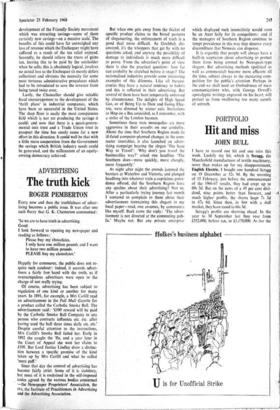The truth kick -
ADVERTISING ROGER PEMBERTON
Every now and then the truthfulness of adver- tising becomes a public issue. It was after one such flurry that G. K. Chesterton commented : `So we are to have truth in advertising.
Good.
I look forward to opening my newspaper and
reading as follows:. •
Please buy my Chocolates.
I only have one million pounds and I want to have two million pounds.
PLEASE buy my chocolates.'
Happily for commerce, the public does not re- quire such caUdou'r.: indeed, it accords adver- tisers a fairly freehand with the truth, as if overscrupulous advertisers were open to the charge of not reallYtrying.
Of course, advertising has been subject to regulation of one kind or another for many years. In 1891, for example, a Mrs Carlill read an advertisement in the Pall Mall Gazette for a product called the Carbolic Smoke BalL The advertisement said :. 1100 reward will be paid by the Carbolic Smolce Ball Company to any person who contracts influenza etc. etc. after having used the ball three times daily etc. etc.' Despite careful attention to the instructions, Mrs Carlill's Smoke Ball failed her. Early in 1892 she caught the 'flu, and a year later in the Court of Appeal she won her claim to f100. But Lord Justice Lindley drew a distinc- tion between a specific promise of the kind taken up by Mrs C-arlill and what he called 'mere puff.'
Since that day the control of advertising has become fairly strict. Some of it is statutory, but most of it is enshrined in the self-imposed codes agreed by the various bodies concerned —the Newspaper Proprietors' Association, the rrA, the Institute of Practitioners in Advertising and the Advertising Association. But when one gets away from the thicket of specific product claims to the broad pastures of sloganeering, the enforcement of truth is a good deal more difficult. As Goebbels dis- covered, it's the whoppers that get by with no questions asked, and anyway the possibility of damage to individuals is much more difficult to prove. From the advertiser's point of view there is also the practical question: how far can credulity be stretched before it snaps? The nationalised industries provide some interesting examples of this dilemma. Like all bureau- cracies they have a natural tendency to hubris and this is reflected in their advertising. But several of them have been temporarily unhorsed by circumstance. The delights of High Speed Gas, or of Being Up to Date and Going Elec- tric, were dimmed by winter cuts. Invitations to Hop on a Bus coincided, as I remember, with a strike of the London busmen.
Sometimes these state monopolies are more aggressive in their assaults •on our credulity. About the time that Southern Region made its ill-fated computer-planned changes in the com- muter timetables, it also launched an adver- tising campaign bearing the slogan 'The Sane Way to Travel': 'Why don't you travel the businesslike way?' asked one headline. 'The Southern does—more quickly, more cheaply, more frequently.'
As night after night the crowds jammed the barriers at Waterloo and Victoria, and plunged headlong into whatever train a capricious provi- dence offered, did the Southern Region have any qualms about their advertising? Not so. After a particularly trying journey last month I ventured to complain to them about their advertisement (containing this slogan) in my local paper—read, one assumes, by commuters like myself. Back came the reply: 'The adver- tisement is not directed at the commuting pub- lic.' Maybe not. But any private enterprise which displayed such insensitivity would soon be an Aunt Sally for its competitors: and if the managers of Southern Region continue to tempt providence in this way they deserve every discomfiture that Nemesis can dispense.
It is arguable that people will always have a built-in scepticism about advertising to protect them from being conned by Newspeak-type slogans. But advertising methods (political as well as commercial) become more efficient all the time, subject always to the increasing com- petition for the public's attention. Perhaps in the end we shall need an Ombudsman of mass communications who, with George Orwell's apocalyptic writings engraved on his heart, will protect us from swallowing too many camels of untruth.


































 Previous page
Previous page